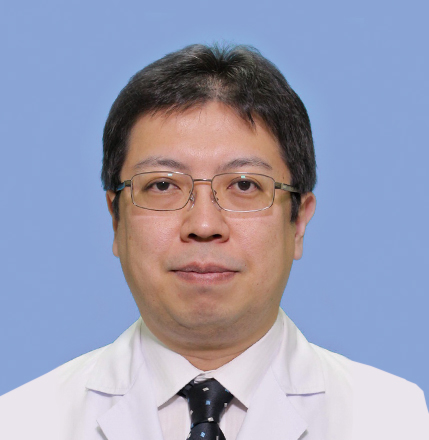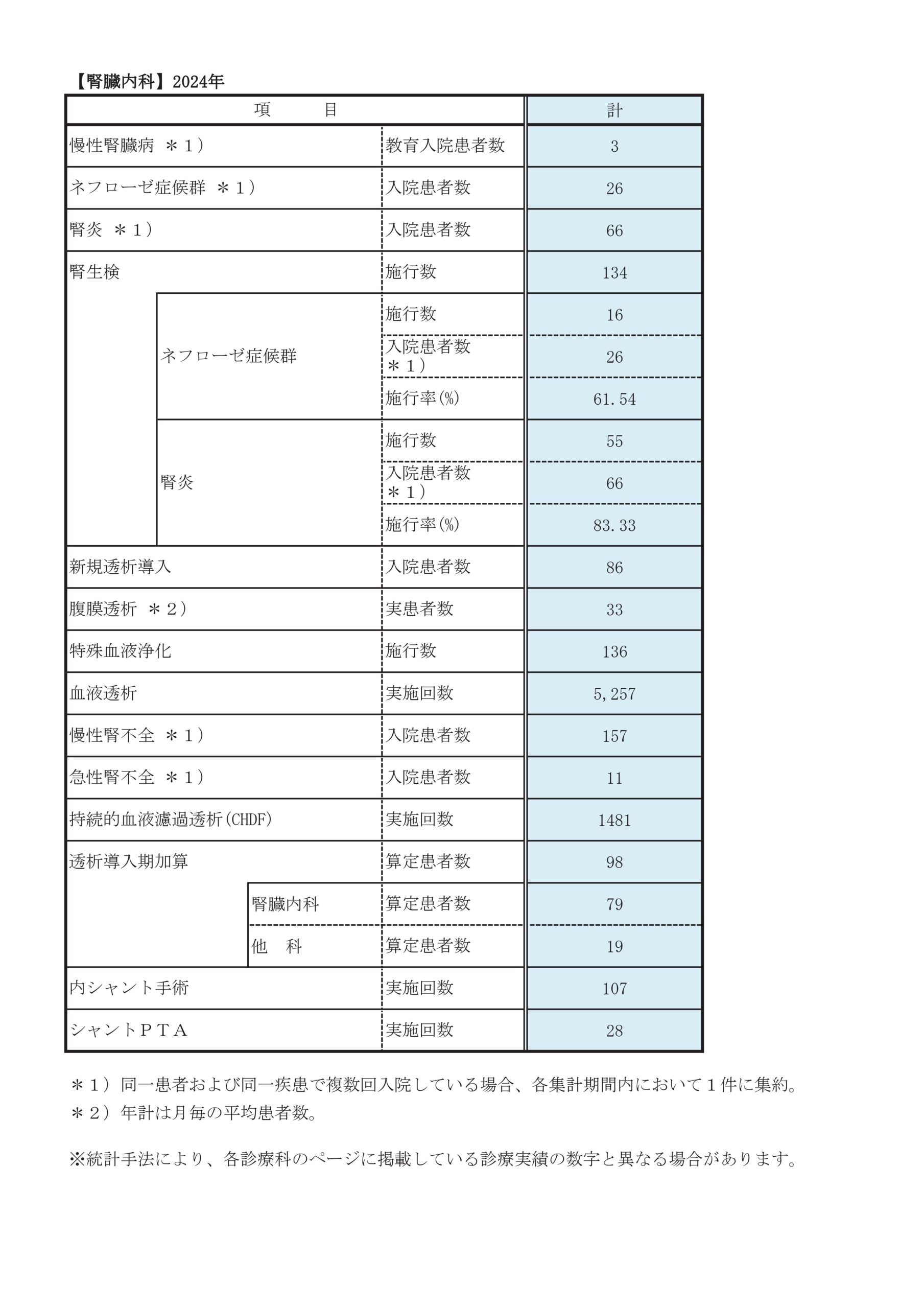腎臓内科では、尿検査異常(蛋白尿、血尿)から腎不全まで、腎臓に関わるさまざまな病態と関連する全身疾患を扱っております。腎炎、ネフローゼ症候群、糖尿病性腎症、血管炎、高血圧(腎硬化症)、膠原病、薬剤関連腎障害などに関わる急性腎不全、慢性腎不全、急速進行性腎障害などが対処疾患です。中でも、心血管合併症の大きな危険因子といわれる慢性腎臓病(CKD)の我が国の患者数は1330万人(20歳以上の成人の8人に1人、神戸市内で約20万人)と推定され、新たな国民病ともいわれています。腎臓の病気は、予防、早期発見、適切な診断、早期治療がもっとも大切です。適切な診断のために、年間約100件の腎生検を必要に応じて積極的に施行して治療に反映しています。また、管理栄養士、薬剤師、検査技師、臨床工学技士、看護師などとチーム医療を展開し、腎臓病教室の開催や腎不全教育入院をすすめております。さらに、腎障害が進行した腎不全患者さんには、血液浄化療法(血液透析、腹膜透析)の導入や腎移植を実施しております。腎疾患以外でも、他科と協力して血漿交換、白血球除去療法、LDLアフェレーシスなどを施行しています。大学病院や腎臓内科関連施設とも協力して高度専門医療・教育活動を展開し、周辺の医療施設と密に病診連携を展開しています。また、かかりつけの先生方とは、患者さんの診断、治療などの情報交換を密にして診療に協力していきたいと思います。さらに、日ごろ市民公開講座や研究会などを開催し、最新の腎臓内科診療の情報提供を心がけています。
診療実績
診療科別統計
主な疾患・治療法
疾患・検査・治療
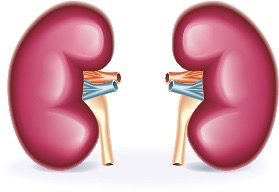
主な疾患名。IgA腎症、紫斑病性腎炎、溶連菌感染後急性糸球体腎炎、微小変化型ネフローゼ症候群、膜性腎症、巣状糸球体硬化症、膜性増殖性糸球体腎炎、急速進行性糸球体腎炎、ループス腎炎など。
検査
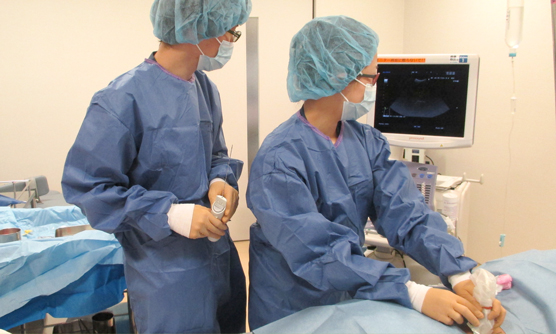
疾患・検査・治療
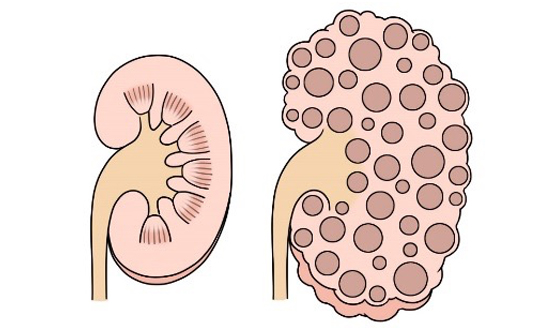
疾患・検査・治療
慢性腎臓病(CKD)はとくに自覚症状がないまま進行しますので、早期発見・早期治療がとても重要です。健診で蛋白尿、血尿を指摘されたり、貧血、夜間頻尿、むくみ、尿の変化(量の増減、泡立つなど)、体がだるいといった状態が続くようであれば、早めに医療機関を受診しましょう。
臨床研究
当院腎臓内科では患者さんにご協力いただき、病気の原因の解明、病気の予防・診断・治療の向上、患者さんのQOLの改善を目的とした臨床研究(観察研究、介入研究、治験)を行っております。
観察研究では患者さんの日常診療でのデータを利用させていただき、直接の同意はいただかず、この掲示をもって同意をいただいたものとして実施しています。
また、院内の臨床研究倫理委員会の承認を受け、患者さん個人に説明し同意いただいてうえで、介入研究や治験も行っています。
研究内容について詳細な説明を希望される方、臨床研究に異議のある方、その他質問のある方は以下の問い合わせ先へご連絡下さい。
| 研究課題名 | 当院責任者 | 承認日 | 説明文 (PDF) |
|---|---|---|---|
| レオカーナ療法中の液性因子についての検討 | 半田貴也 | 2025/9/5 | — |
| 透析間体重増加量に影響を及ぼす因子の解明および新たな介入方法の検討 | 半田貴也 | 2025/9/9 | — |
| 腹膜透析患者のグリコカリクスの臨床的意義についての検討 | 半田貴也 | 2025/10/1 | — |
| カプラシズマブ登場に伴う後天性血栓性血小板減少症での血漿交換の意義についての検討 | 半田貴也 | 2025/10/30 | |
| 多彩な腎疾患における三次リンパ組織の有無ならびに成熟度と治療反応性・予後の解析 | 吉本明弘 | 2025/2/21 | |
| 退院時のステロイド投与量による感染症の発症及び再入院に関する研究 | 大﨑啓介 | 2024/2/29 | |
| 京都大学医学部附属病院腎臓内科 関連病院腎疾患データベース構築に関する観察研究 | 吉本明弘 | 2021/11/18 | |
| レニン・アンジオテンシン系抑制薬とCOVID-19感染症重症化の関連性に関する調査研究 | 吉本明弘 | 2020/11/6 |
お知らせ
4階透析・血液浄化センター内の血液浄化外来では、全身状態の比較的安定した方を対象に血液浄化療法(血液吸着療法・血漿交換療法)を行っております。
血液浄化療法とは、従来の内服薬や注射薬だけではコントロールの困難な疾患、病状に対して、血液を一旦体外に循環させ、血漿中に存在する病気の原因となる物質を直接除去し、再び体に戻す治療法です。
これまで有効な治療法が確立していない疾患も対象にしており、さらにステロイドや免疫抑制剤などの副作用の強い薬剤でしか効果が得られなかった疾患に対して、治療効果の増強や治療薬の副作用軽減などを目的とした治療法です。そのほか、ASO(閉塞性動脈硬化症)などでは、LDL吸着療法により症状の改善も認められています。
血液浄化療法は、施行できる施設に限りがあり、未だ認知度は高くない治療法ではありますが、当科では各専門科や先端医療センターと連携しつつ、主に下記の疾患を対象に適応を見定め積極的に治療を行っております。
多くの浄化法は定期的に何回か行い効果を判定します。保険適応や社会保障制度もありますので、お気軽にご相談ください。
当院にて取り扱っている主な疾患
腎臓疾患
- 巣状糸球体硬化症(ネフローゼ症候群)
循環器疾患
- ASO(閉塞性動脈硬化症)
- 家族性高コレステロール血症
消化器疾患
- 潰瘍性大腸炎、難治性腹水症
自己免疫性疾患
- 関節リウマチ、膠原病
- 神経、筋疾患
- 天疱瘡、類天疱瘡
など
